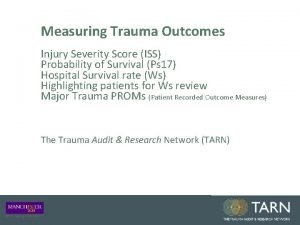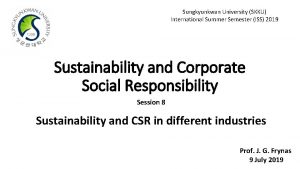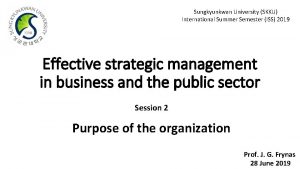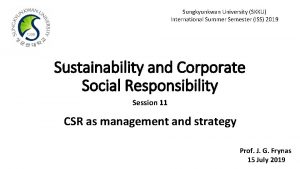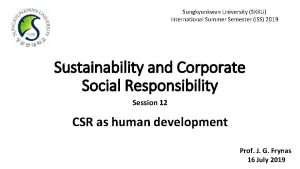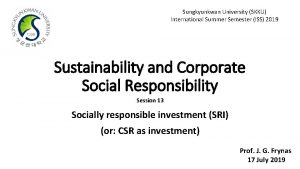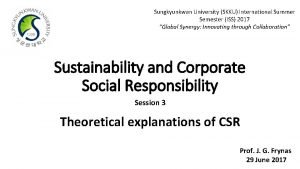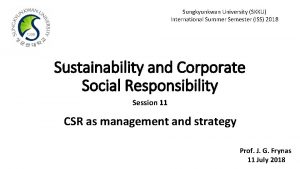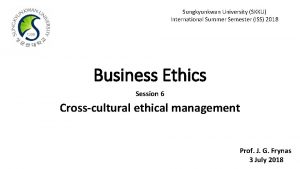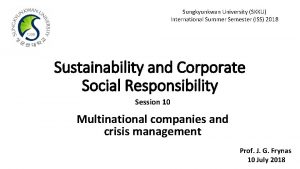Sungkyunkwan University SKKU International Summer Semester ISS 2019































- Slides: 31

Sungkyunkwan University (SKKU) International Summer Semester (ISS) 2019 Sustainability and Corporate Social Responsibility Session 1 Corporate Social Responsibility and Globalization Prof. J. G. Frynas 27 June 2019

Few requests • Please read the course outline (latest online version) • Please be considerate to your fellow peers and please switch off your mobile phone • Please be punctual for all sessions • Please read the Frynas and Yamahaki (2018) introductory chapter on corporate social responsibility

Classroom Task: Royal Dutch/Shell – Case Study Please read the case study: Two crises influence the strategy of Royal Dutch/Shell Why was Royal Dutch/Shell waiting so long to take social and environmental stakeholder issues seriously?

Milton Friedman on Responsibility There is one and only one social responsibility of business - to use its resources and engage in activities designed to increase its profits. (Milton Friedman)

Can a corporation have social responsibilities? • Milton Friedman’s classic article is “The social responsibility of business is to increase its profits” (1970) • Friedman vigorously argued against the notion of social responsibilities for corporations based on three main arguments: • Only human beings have a moral responsibility for their actions • It is managers’ responsibility to act solely in the interests of shareholders • Social issues and problems are the proper province of the state rather than corporate managers

Is Friedman’s view “dead”? The idea of profit at any cost is something that is past its time. Ralph Shrader, Chairman/CEO, Booz Allen Hamilton • In a 2008 Mc. Kinsey Survey of 2687 executives, 16% agreed with Friedman that high returns should be a firm’s only focus, 84% said that high returns to investors should be accompanied by broader contributions to the public. • In a 2013 survey of 1000 global CEOs from 107 countries by Accenture, 93% of CEOs believed that sustainability will be important to the future success of their business.

Why do corporations have social responsibilities? Moral reasons: • Corporations cause social problems • Corporations should use their power responsibly • All corporate activities have some social impacts • Corporations rely on the contribution of a wide set of stakeholders in society, not just shareholders Business reasons (‘enlightened self-interest’): • Extra and/or more satisfied customers • Employees may be more attracted/committed • Forestall legislation • Long-term investment which benefits corporation

CSR is not the same as business ethics Business ethics is the study of business situations, activities and decisions where moral issues of right and wrong are addressed. Andrew Crane and Dirk Matten CSR can involve ethical questions and companies may be said to have ethical responsibilities. However, business ethics is about individuals taking moral decisions. CSR does not have to be guided by moral reasons.

Ethical codes vs. CSR policy Ethical Values underpin…. approach to Corporate Responsibility Ethical Policy & Ethics Code doing things ethically CSR Policy doing ethical things Philanthropic programmes Environmental programmes Social programmes Source: Philippa Back, Institute of Business Ethics

Precursors of Ethical Business Kautilya 4 th century BC Cicero 1 st century BC Cadbury factory 19 th century

Growth in ISO 14001 as example Number of ISO 14001 certifications at year-end, 2000 -17 400000 350000 300000 250000 200000 150000 100000 50000 0 2002 2004 2006 2008 2010 2012 2014 2016 Source: ISO Survey 2017

Growth of CSR in the UK and world-wide • In 1988, 18% of FTSE 100 • In 2006, 90% of FTSE companies had an ethical 100 companies had an code of practice. ethical code. • In 2002, 45% of Global 250 had a CSR report. • In 2015, 92% of G 250 had a CSR report. • In 2011, 20% of India’s 100 largest companies had a CSR report. • In 2015, 100% of India’s 100 largest firms had a CSR report.

Global vs. International Globalization…at its simplest means crossing borders. Capital crosses borders; companies cross borders; whole industries cross borders; people, ideas, diseases, even governments cross borders. (The Economist, 2001) But can we accept such a definition of globalization? People, ideas and private companies have crossed borders for hundreds of years. There is a major difference b. internationalization and globalization…

Internationalization refers to… processes involving the simple extension of economic activities across national boundaries. It is, essentially a quantitative process which leads to a more extensive geographical pattern of economic activity. (Peter Dicken)

Globalization is… different from internationalization processes. Globalization involves not merely the geographical extension of economic activity across national boundaries but also - and more importantly - the functional integration of such internationally dispersed activities. (Peter Dicken)

The losers of globalization Critics argue that globalization has exacerbated inequality, as winners of globalization (esp. workers with esoteric skills and MNEs) have further concentrated their power. Consider: • Out of 6 billion people, 2. 8 billion live on less than $2 a day, 1. 2 billion live on less than $1 a day, as the richer got richer. • The number of chronically hungry people in the world declined steadily in the 1970 s and 1980 s, but has been increasing since the early 1990 s; 800 million people go to bed hungry every night. • Unskilled workers are vulnerable to job losses (call centre migration or textile jobs) as their bargaining power vs. employers declined. • Inequality is also deepening within the developed countries; e. g. 35% of US jobs described as “grunge jobs”. • The Growing Divide: The world’s 475 billionaires equal the combined income of the bottom half of mankind

Even the CIA is worried… Globalization will create “an even wider gap between regional winners and losers than exists today. [Globalization’s] evolution will be rocky, marked by chronic volatility and a widening economic divide… deepening economic stagnation, political instability, and cultural alienation. [It] will foster political, ethnic, ideological, and religious extremism, along with the violence that often accompanies it”. (US Central Intelligence Agency study Global Trends 2015) So can/should business address social issues?

CSR: Globalization Context • Rise of deregulation from the 1980 s (including changing ideology and GATT/WTO): • more areas of society are left to private sector • reluctance or inability of some countries to impose higher labour or environmental standards • no global institutions to enforce global standards. • Rise of global communications and non-governmental organizations and call for businesses to fill the void left behind by the state.

New technologies and CSR Risk of damaging global reputations for the MNE Ability to co-ordinate global NGO campaigns

What is CSR? Unfortunately, there is no agreement on what CSR is or what a company should be responsible for. To confuse everyone, the CSR concept is either replaced or supplemented by new terms such as: • • • Corporate accountability Corporate citizenship Corporate responsibility Socially responsible investment Sustainable Development

Blowfield/Frynas CSR definition The European Commission simply defined CSR as ‘the responsibility of enterprises for their impacts on society’. It may be useful to think of CSR as an umbrella term for a variety of views and practices all of which recognize the following: 1. that companies have a responsibility for their impact on society and the natural environment, sometimes beyond legal compliance and liability of individuals; 2. that companies have a responsibility for the behaviour of others with whom they do business (e. g. suppliers); 3. that business needs to manage its relationship with wider society, whether for reasons of commercial viability or to add value to society.

Responsibility in global supply chains

…but different issues by sector Key issues for selected sectors: mining, oil and gas chemicals fast-food chains printing companies tobacco clothing and shoes local communities environmental impact obesity paper recycling & water use health impact of smoking labour working conditions

…and different issues by country/region Source: Cambridge Programme for Industry 2006

Classroom Task: Pharmaceutical companies Please read the case study: Pharmaceuticals – What are the limits to responsibility? Please divide into groups of 3 -4 and answer these questions: • What are the main corporate social responsibility issues that the pharmaceutical industry needs to address? • Do you think that the profit motive of pharmaceutical companies helps or harms their ethical mission?

Carroll’s four-part model of CSR Corporate social responsibility includes economic, legal, ethical, and philanthropic expectations placed on organizations by society at a given point in time (Carroll and Buchholtz 2009: 44) Desired by society Philanthropic Responsibilities Ethical Responsibilities Expected by society Required by society Legal Responsibilities Required by society Economic Responsibilities Source: Carroll (1991)

Economic responsibility • Economic responsibility refers to the fundamental responsibility of business to deliver goods and services that society wants. • Within a system of free enterprise, business makes a major contribution to society by providing jobs, investment, innovation, shareholder value as well as jobs and services. • Think of provision of mobile phones in Africa – substitute for nonfunctioning monopolistic land line companies, lowering transaction costs for farmers and small business, payment systems (M-Pesa).

Legal responsibility • Legal responsibility refers to the responsibility of business to fulfil its economic mission within the confines of the law. • Local law, national law and international law set out the rules by which companies play and prescribe what companies can or cannot on areas such as employment, environmental protection, product safety, human rights etc. • Think of many businesses in developing countries that avoid following the law because they can get away with it – before they conduct CSR projects, should they not follow the law first?

Ethical responsibility • Ethical responsibility refers to the responsibilities of business that go beyond the law, and are not determined by economic calculations. • Ethical responsibility can driven by cultural norms (e. g. understanding of fairness), professional standards (e. g. integrity) or driven by external pressures (e. g. activist pressures, government etc). • Think of climate change – even though it is not prescibed by law, many companies think that they have a responsibility to reduce their energy use in order to tackle greenhouse emissions.

Philanthropic (discretionary) responsibility • Philanthropic responsibility refers to the responsibilities that a business assumes even if there are no clear societial expectations. • Philanthropic responsibility is discretionary. • Philanthropic responsibility can be values-driven, in particular the ethical stance of the owners or CEO. • Think of business leaders sich as Anita Rodick of the Body. Shop in the UK or Ratan Tata of Tata’s group of companies in India.

Responsibility depends on your point of view If your starting point is… Capitalism is fundamentally wrong Then the value of CSR may be this. . . CSR has little to offer, although it may help you to critisize capitalism Free markets are self-regulating and CSR has little to offer and may destroy companies inherently conribute to social shareholder value good by producing goods and services Free market capitalism is essentially good but needs restraining or controlling Responsible behaviour can be a driver of business success CSR can offer to restrain irresponsible practices or ensure better standards CSR can be a framework for identifying behaviour that will deliver financial value Source: Blowfield, M. and Murray, A. Corporate Responsibility 3 rd ed. (Oxford University Press, 2014)
 Skku iss
Skku iss Unsw academic calender
Unsw academic calender Campus connect cisco college
Campus connect cisco college Alpbach summer school 2019
Alpbach summer school 2019 Kiwanis international convention 2019
Kiwanis international convention 2019 China international import export 2019
China international import export 2019 īss alegorisks vēstījums ar pamācošu saturu
īss alegorisks vēstījums ar pamācošu saturu Iss
Iss Eye retina vulnerability scanner
Eye retina vulnerability scanner Injury severity score
Injury severity score Chest ais
Chest ais Terra dotta tamu
Terra dotta tamu Iss tamu terra dotta
Iss tamu terra dotta Aufbau iss
Aufbau iss Sigissweb leme
Sigissweb leme Iss kosten
Iss kosten Thang điểm iss
Thang điểm iss Iss ham radio antenna
Iss ham radio antenna Iata new gen iss
Iata new gen iss Opwdd iss housing subsidy
Opwdd iss housing subsidy Zuurstofkaars
Zuurstofkaars Iss patetta
Iss patetta Via silvestri 301
Via silvestri 301 Iss
Iss I 20 form sample
I 20 form sample Prevision passage iss
Prevision passage iss Uw iss
Uw iss Salmon et durie
Salmon et durie Iss
Iss Esa multimedia.esa.int./multimedia/virtual-tour-iss
Esa multimedia.esa.int./multimedia/virtual-tour-iss Iss pirs module
Iss pirs module Eva technology
Eva technology









